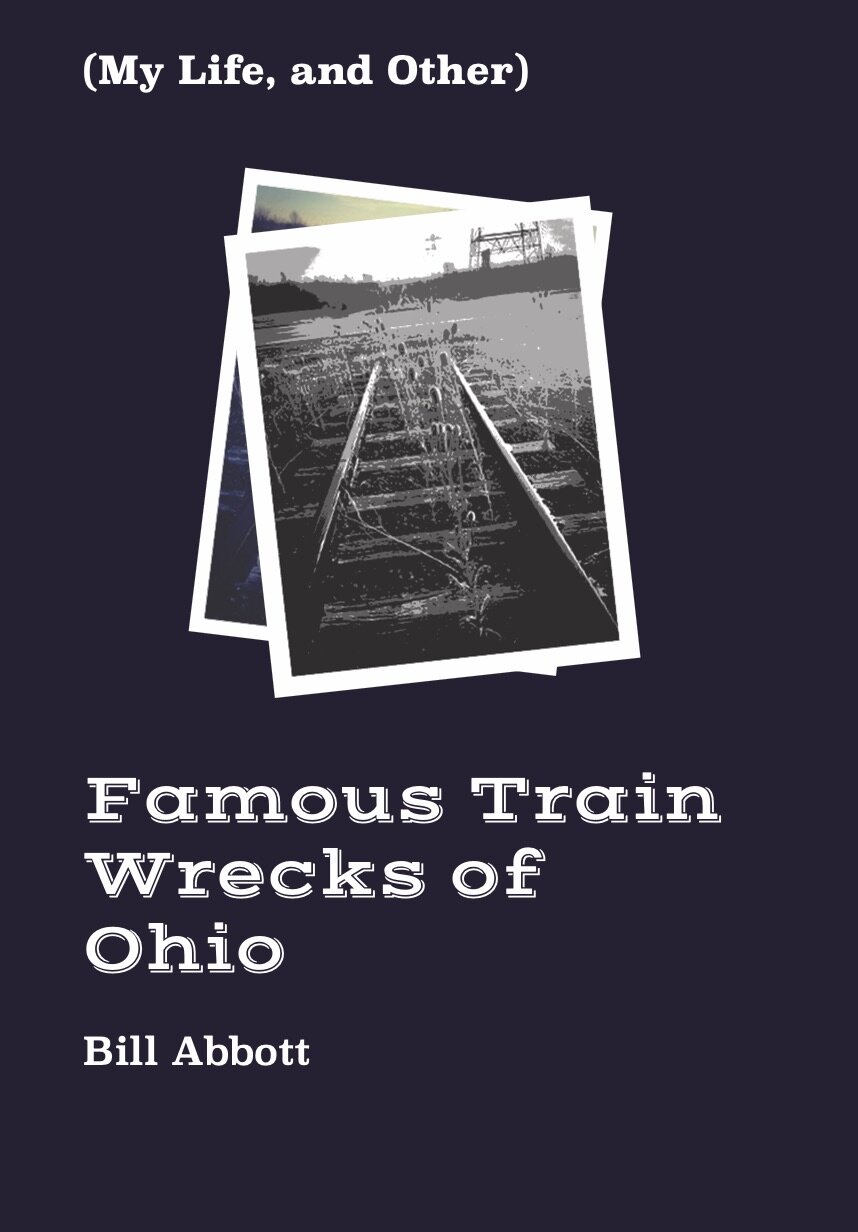(My Life, and Other) Famous Train Wrecks of Ohio by Bill Abbott, Reviewed by Sally Weston Ziph
Bill Abbott’s (My life, and other) Famous Train Wrecks of Ohio
Bill Abbott, author of Let Them Eat MoonPie—a history of poetry slam in the southeast—has a new collection of poems out from Milk & Cake Press called (My Life, and Other) Famous Train Wrecks of Ohio. Train wrecks, both metaphorical and historical, collide in these free verse sonnets and multi-stanza poems about divorce, dating, being a single dad, and the loss of a parent. Abbott’s speaker resides in the post-industrial city of Middletown, Ohio, a place that, “is unsure if it exists / or if it is just between.” The poems, which are also about the loss of one’s identity (as a husband, a son, a lover, etc.), are loosely grouped into sections corresponding to the framing device of actual train wrecks. For example, in, “The Expansion of Metal: Middletown,” the speaker states, “20 are killed / among them an unidentified man / with the initials W.A. on his clothing. / My initials, in the town where I live, / just over a hundred years later.”
There are also frank poems about the kind of serious depression that can result from too many major life events at once. In, “What I Told My Counselor,” the speaker admits, “There are bullets in the basement, / but I have no desire to use them.” This dark tone is mostly balanced by Abbott’s wry humor, as in the poem, “The Art of Death”: “Some may think death is cheapened by / theatrics, but those are not your people.”
Abbott is a well-known figure from the poetry slam circuit of the 90’s and aughties, and he has an ear attuned to cultural references and absurdities. Some of the book’s best moments include lines like this one from a poem about channel surfing: “<click> / We’ve replaced this man’s overwhelming ennui / with Folger’s crystals. Let’s see if he notices.” To be sure, the book’s most crowd-pleasing poems are the ones about post-divorce dating. To quote from “The Abyss” (with an epigraph by Nietzsche): “If you friend the abyss on Facebook, / the abyss will confirm your friend request. / . . . If you tell the abyss where you live / you can look forward to the abyss standing in your front yard / with a boombox over its head / playing that Peter Gabriel song.” That poem ends with these lines, “Your mom called. She talked to the abyss. / She thinks you’d make a cute couple.”
The loss of a parent is also addressed. In, “Collected Albums,” the speaker and his siblings sort through his mother’s things after her death. “My mother is gone, all her stuff / left to us. I have the photos, my sister the words, / but no photos collected just for me.” Mom’s oversight lends a kind of mournful irony to the speaker’s question in a later poem, “The Hero of the Story”: “Don’t you wonder if there’s more to it than this? / We believe ourselves the hero of this story / despite the evidence...”
Whereas loss is a predominant theme in the book, (My Life, and Other) Famous Train Wrecks of Ohio ends on a serious but hopeful note with, “And after every tragedy, we clean up. It takes / time and effort but eventually people can’t even tell where the pieces fell, / where the bodies bled into the ground / where their world changed.”
July 2020
Sally Weston Ziph
Sally Weston Ziph is a low residency MFA candidate in poetry at Miami University. Her poems and short stories have appeared in The Five-Two, Bear River Review, Third Wednesday, and others. She is a Hopwood Award winner, and works as a librarian at the University of Michigan, Ann Arbor.



